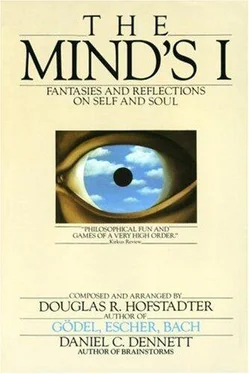The claim that “machines cannot make mistakes” seems a curious one. One is tempted to retort, “Are the any the worse for that?” But let us adopt a more sympathetic attitude, and try to see what is really meant. I think this criticism can be explained in terms of the imitation game. It is claimed that the interrogator could distinguish the machine from the man simply by setting them a number of problems in arithmetic. The machine would be unmasked because of its deadly accuracy. The reply to that is simple. The machine (programmed for playing the game) would not attempt to give the right answers to the arithmetic questions. It would deliberately introduce mistakes in a manner calculated to confuse the interrogator. A mechanical fault would probably show itself through an unsuitable decision to what sort of mistake to make in the arithmetic. Even this interpretation of the criticism is not sufficiently sympathetic. But we cannot afford the space to go into it much further. It seems to me that this criticism depends on a confusion between two kinds of mistakes. We may call them “errors of functioning” and “errors of conclusion.” Errors of functioning are due to some mechanical or electrical fault which causes the machine to behave otherwise than it was designed to do. In philosophical discussions one likes to ignore the possibility of such errors, one is therefore discussing “abstract machines.” These abstract machines are mathematical fictions rather than physical objects. By definition they are incapable of errors of functioning. In this sense we can truly say that “machines can never make mistakes. ”Errors of conclusion can only arise when some meaning is attached to the output signals from the machine. The machine might, for instance, type out mathematical equations, or sentences in English. When a false proposition is typed we say that the machine has committed an error of conclusion. There is clearly no reason at all for saying that a machine cannot make this kind of mistake. It might do nothing but type out repeatedly “0=1.” To take a less perverse example, it might have some method for drawing conclusions by scientific induction. We must expect such a method to lead occasionally to erroneous results.
The claim that a machine cannot be the subject of its own thought can of course only be answered if it can be shown that the machine has some thought with some subject matter. Nevertheless, “the subject matter of a machine’s operations” does seem to mean something, at least to the people who deal with it. If, for instance, the machine was trying to find a solution of the equation x 2− 40x − 11 = 0, one would be tempted to describe this equation as part of the machine’s subject matter at that moment. In this sort of sense a machine undoubtedly can be its own subject matter. It may be used to help in making up its own programs, or to predict the effect of alterations in its own structure. By observing the results of its own behaviour it can modify its own programs so as to achieve some purpose more effectively. These are possibilities of the near future, rather than Utopian dreams.
The criticism that a machine cannot have much diversity of behaviour is just a way of saying that it cannot have much storage capacity. Until fairly recently a storage capacity of even a thousand digits was very rare.
The criticisms that we are considering here are often disguised forms of the argument from consciousness. Usually if one maintains that a machine can do one of these things and describes the kind of method that the machine could use, one will not make much of an impression. It is thought that the method (whatever it may be, for it must be mechanical) is really rather base. Compare the parenthesis in Jefferson’s statement quoted above.
6. Lady Lovelace’s objection. Our most detailed information of Babbage’s Analytical Engine comes from a memoir by Lady Lovelace. In it she states, “The Analytical Engine has no pretensions to originate anything. It can do whatever we know how to order it to perform” (her italics). This statement is quoted by Hartree who adds: “This does not imply that it may no be possible to construct electronic equipment which will think for itself,” or in which, in biological terms, one could set up a conditioned reflex, which would serve as a basis for ‘learning.’ Whether that is possible in principle or not is a stimulating and exciting question, suggested by some of these recent developments. But it did not seem that the machines constructed or projected at the time had this property.”
I am in thorough agreement with Hartree over this. It will be noticed that he does not assert that the machines in question had not got the property, but rather that the evidence available to Lady Lovelace did not encourage her to believe that they had it. It is quite possible that the machines in question had in a sense got this property. For suppose that some discrete state machine has the property. The Analytical Engine was a universal digital computer, so that, if its storage capacity and speed were adequate, it could by suitable programming be made to mimic the machine in question. Probably this argument did not occur to the Countess or to Babbage. In any case there was no obligation on them to claim all that could be claimed.
A variant of Lady Lovelace’s objection states that a machine can “never do anything really new.” This may be parried for a moment with the saw, “There is nothing new under the sun.” Who can be certain that “original work” that he has done was not simply the growth of the seed planted in him by teaching, or by the effect of following well-known general principles? A better variant of the objection says that a machine can never “take us by surprise.” This statement is a more direct challenge and can be met directly. Machines take me by surprise with great frequency. This is largely because I do not do sufficient calculation to decide what to expect them to do, or rather because, although I do a calculation, I do it in a hurried, slipshod fashion, taking risks. Perhaps I say to myself, “I suppose the voltage here ought to be the same as there; anyway let’s assume it is.” Naturally I am often wrong, and the result is a surprise for me, for by the time the experiment is done these assumptions have been forgotten. These admissions lay me open to lectures on the subject of my vicious ways, but do not throw any doubt on my credibility when I testify to the surprises I experience.
I do not expect this reply to silence my critic. He will probably say that such surprises are due to some creative mental act on my part, and reflect no credit on the machine. This leads us back to the argument from consciousness and far from the idea of surprise. It is a line of argument we must consider closed, but it is perhaps worth remembering that the appreciation of something as surprising requires as much of a “creative mental act” whether the surprising event originates from a man, a book, a machine or anything else.
The view that machines cannot give rise to surprises is due, I believe, to a fallacy to which philosophers and mathematicians are particularly subject. This is the assumption that as soon as a fact is presented to a mind all consequences of that fact spring into the mind simultaneously with it. It is a very useful assumption under many circumstances, but one too easily forgets that it is false. A natural consequence of doing so is that one then assumes that there is no virtue in the mere working out of consequences from data and general principles.
7. Argument from Continuity in the Nervous System. The nervous system is certainly not a discrete state machine. A small error in the information about the size of a nervous impulse impinging on a neuron may make a large difference to the size of the outgoing impulse. It may be argued that, this being so, one cannot expect to be able to mimic the behaviour of the nervous system with a discrete state system.
Читать дальше











